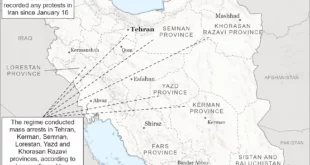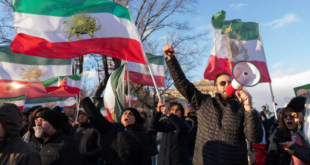 TEHRAN (FNA)- Any offensive action by Tel Aviv would be seen as an attack by Washington, Iranian Foreign Minister Manouchehr Mottaki said symbolizing Israel as a signature mark of the United States in the middle east.
TEHRAN (FNA)- Any offensive action by Tel Aviv would be seen as an attack by Washington, Iranian Foreign Minister Manouchehr Mottaki said symbolizing Israel as a signature mark of the United States in the middle east.
Iran does not believe that Israelis or Americans will attack its nuclear facilities but any attack by Tel Aviv would be considered an attack by Washington, Mottaki said.
“In the Middle East, (no one) makes a distinction between the US and Israel,” the minister told Newsweek in an interview.
Reiterating to continue its uranium enrichment program, he said, “What we are doing is completely legal,” emphasizing that negotiations are the only way to arrive at a mutually acceptable solution to the issue.
Mottaki, however, welcomed the Bush administration’s decision to send its Undersecretary William Burns to attend recent talks between Tehran and European Union on nuclear issue, describing it as “the first realistic step” by Washington.
“We welcomed the participation by Mr. Burns in the Geneva talks. We feel that if this is the realistic approach taken by the US right now vis-Ã -vis the nuclear issue, they must continue with such efforts,” he added.
The foreign minister said that previously, the administration of President George W. Bush attached conditions to its participation in the talks with Iran.
Burns’s presence in Geneva, argued Mottaki, “meant that those were no longer in play.”
An effort has started and if it is to succeed in resolving the nuclear issue, we have to take it to the next step,” he added.
Asked why his country is calling for wiping out Israel from the map of the earth, Mottaki said Tehran does not recognize Israel.
Elsewhere, Mottaki said in an interview with the Al-Jazeera on Saturday that Iran does not recognize the Zionist regime as a principle of foreign policy.
He compared the Israeli regime with the apartheid regime of the South Africa.
Asked whether the Zionist regime could attack the Iranian nuclear sites, Mottaki said, “Israel could only make such a move with the US help as it is not capable of launching any attack by itself.”
However, Tel Aviv will receive due response as Iran is neither Afghanistan nor Iraq, Mottaki stressed.
Israel and its close ally the United States accuse Iran of seeking a nuclear weapon, while they have never presented any corroborative document to substantiate their allegations. Both Washington and Tel Aviv possess advanced weapons of mass destruction, including nuclear warheads.
Iran vehemently denies the charges, insisting that its nuclear program is for peaceful purposes only. Tehran stresses that the country has always pursued a civilian path to provide power to the growing number of Iranian population, whose fossil fuel would eventually run dry.
Speculation that Israel could bomb Iran has mounted since a big Israeli air drill in June. In the first week of June, 100 Israeli F-16 and F-15 fighters reportedly took part in an exercise over the eastern Mediterranean and Greece, which was interpreted as a dress rehearsal for a possible attack on Iran’s nuclear installations.
Iran has, in return, warned that it would target Israel and its worldwide interests in case it comes under attack by the Tel Aviv.
The United States has also always stressed that military action is a main option for the White House to deter Iran’s progress in the field of nuclear technology.
Iran has warned it could close the strategic Strait of Hormoz if it became the target of a military attack over its nuclear program.
Strait of Hormoz, the entrance to the strategic Persian Gulf waterway, is a major oil shipping route.
Intensified threats by Tel Aviv and Washington of military action against Iran contradict a recent report by 16 US intelligence bodies which endorsed the civilian nature of Iran’s nuclear plans and activities.
Following the US National Intelligence Estimate (NIE) and similar reports by the IAEA head – one in November and the other one in February – which praised Iran’s truthfulness about key aspects of its past nuclear activities and announced settlement of outstanding issues with Tehran, any effort to impose further sanctions or launch military attack on Iran seems to be completely irrational.
The February report by the UN nuclear watchdog, the International Atomic Energy Agency, praised Iran’s cooperation in clearing up all of the past questions over its nuclear program, vindicating Iran’s nuclear program and leaving no justification for any new UN sanctions.
The UN nuclear watchdog has also carried out at least 14 surprise inspections of Iran’s nuclear sites so far, but found nothing to support West’s allegations.
Following the said reports by the US and international bodies, many world states have called the UN Security Council pressure against Tehran unjustified, demanding that Iran’s case be normalized and returned from the UNSC to the IAEA.
There have also been intense discussions about whether the Israeli air force and navy could successfully carry out an attack by itself against multiple targets more than 1,200 kilometers away that are believed to be scattered and often buried deep underground.
A recent study by the Institute for Science and International Security (ISIS), a prestigious American think tank, has found that a military strike on Iran’s nuclear facilities “is unlikely” to delay the country’s program.
Also another study recently conducted by the Bipartisan Policy Center and prepared under the guidance of former senators Republican Daniel Coats and Democrat Charles Robb also said that the US must strike Iran’s nuclear sites many times ‘over a period of years’ to halt the program successfully, otherwise Pentagon would achieve nothing.
Military analysts said that a unilateral strike on Iran by Israel would achieve nothing and seemed more like a joke as it would backfire with overwhelming retaliatory strikes by the Islamic Republic and its allies on Israel, the United States and their worldwide interests.
 Eurasia Press & News
Eurasia Press & News


